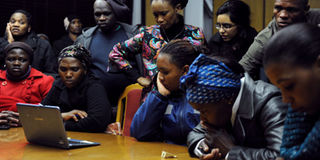South Africa frustration at Marikana deaths inquiry

Relatives of miners killed during the Marikana police shooting in 2012 listen on a device to president Jacob Zuma delivering the findings of a commission of inquiry on the shooting on Thursday. PHOTO BY AFP
President Jacob Zuma’s release of the 600-page Marikana report has sparked yet another national conversation about the rule of law in South Africa.
This follows hot on the heels of the Omar al-Bashir controversy, and the trials of Oscar Pistorius and Shrien Dewani.
Was the report a whitewash? Ferial Haffajee, editor of the weekend newspaper City Press, tweeted: “Sticking my neck out: I don’t think ‘whitewash’ sticks.”
Many South Africans took to social media to condemn the report, especially its recommendations.
They wanted to see a huge political figure, such as deputy president Cyril Ramaphosa, take responsibility for his actions.
At the time, Mr Ramaphosa was a shareholder in Lonmin, the owner of the Marikana mine.
But president Zuma was reading the commission’s recommendations. These were not his findings.
Reports of this nature appear to be simple but they are full of legalese. A lot of the conclusions are left to interpretation or suggest another investigation.
One can sympathise with the people who lost loved ones three years ago and are utterly frustrated by the idea of yet another inquiry.
If an investigation is launched by prosecutors, the trial might drag for a very long time, meaning victims and relatives may never find closure.
While the report apportions some fault to the unions who took part in the wildcat wage strike, much of the blame is aimed squarely at the police.
Police chief Riah Phiyega seems to be the highest-ranking person likely to take the hit.
Some of her junior staff are vulnerable too, such as the regional police chief of the North West province, Lieutenant-General Zukiswa Mbombo.
Just before police opened fire on the miners, Lt Gen Mbombo told the media: “Today is D-Day: we are ending this matter”.
Last month, she announced she was retiring.
There does not seem to be any politician who is going to take responsibility for the killings of the 44.
There is no way president Zuma could afford to let his trusted deputy Cyril Ramaphosa shoulder some of the blame because that would jeopardise the current leadership succession plan.
If Mr Ramaphosa had to go to prison for sending emails asking the police minister to intervene at the mine during the violent wage strike, there would be a gaping hole in the post-Zuma ANC leadership line-up.
Once the dust settles, we will see whether the police chief will voluntarily step down or if she leaves the man who appointed her no choice but to fire her.
The sad part of this saga is that there are no talks of reparations for the miners who died and most of them were breadwinners.
About the report
The report of a commission of inquiry into the worst police violence in South Africa since the end of apartheid was released by president Jacob Zuma on Thursday night.
It called for the officers involved to face a criminal investigation and for an inquiry into National Police Commissioner Riah Phiyega’s fitness to hold office.
But it cleared senior government officials of any culpability, including then police minister Nathi Mthethwa and former mines minister Susan Shabangu.
BBC




